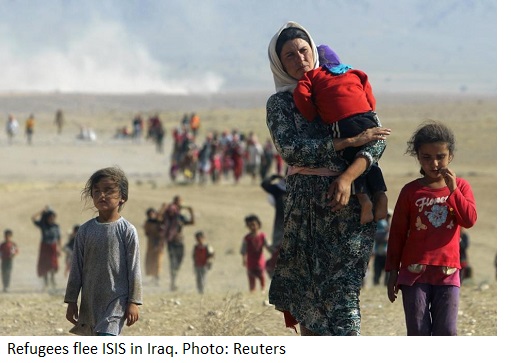
The policy of forced conversions of religious minorities in the areas of Iraq and Syria held by the Islamic State has led to a wide displacement of people and a refugee flow into Turkey. Even Muslim Shi’ites have been attacked by the Sunni militants of the Islamic State. Attention has been given to the fate of Christians, mostly the Chaldean and Assyrian churches, as they are international Christian organizations, and because of the power of the Vatican, which has observer state status at the United Nations and the World Council of Churches, which has non-governmental Organization consultative status with the UN. Both organizations were active during the Special Session of the Human Rights Council on September 1st,2014 on Iraq and have continued to be active on the issue during the regular session during September 8-28 of this year.
In an earlier article for Toward Freedom, I highlighted the dangerous position of two religious minorities, the Yazidis and the Mandaeans. There is another religious minority mentioned by the Deputy High Commissioner for Human Rights at the start of the Special Session as being persecuted. These are the Shabak, mentioned, but with no information given as to who they are. The Deputy High Commissioner gave a list of repressed minorities but the list included ethnic minorities such as the Turkomans (the term used in Iraq for ethnic Turks) as well as religious minorities.
Thus there was just this short note on the Shabak, which is a separate religion, though sometimes considered as a minority current among the Shi’ites. To make things more complex, the Shabak are originally found largely among one ethnic group, pastoralists who came from Central Asia, probably Kirghistan during the 15th century. They inter-married with Turkomans and Kurds and thus largely lost their ethnic character. Today, they are identified by their religious beliefs. As with the Yazidis and the Mandaeans, they are members of no international religious organization who can highlight their difficulties. Thus there is a need for non-sectarian human rights organizations to focus attention on them.
The Shabak are largely in villages dispersed to the east of Mosul, Iraq, now held by the IS. There are some villages further north, and a few individuals have migrated to work in other cities. But it is basically in the Mosul area where they have been concentrated prior to the July, 2014 fighting in the Mosul area.
As with the Yazidis and the Mandaeans, the Shabak do not try to convert people to their beliefs; one enters only by birth. The newly-born infant is brought to a religious leader (a Pir, the Sufi term for a religious leader) who confers his blessing on the child in a special ceremony. Thus there is little written material presenting their belief systems which includes some beliefs from pre-Islamic Central Asia as well as elements taken from Shi’ite Sufi currents, Christian beliefs from their Assyrian neighbors as well as revival movements of dissident currents of Islam which found refuge in the mountainous area. They do have a sacred book, the Book of Manaqib, which tells the story of a soul from birth to its entry into paradise with advice given along the way. From the Christians, they have taken the idea of the confession of sins to the Pir and a ceremony on the pattern of the Lord’s Supper with bread and wine.
The Mosul area has long been a “melting pot” where religious and ethnic groups influenced each other but never “melted” so they have kept individual identity. Thus families are easily identified as Christian, Yazidi, or Shabak. Families are “encouraged” to convert to Sunni Islam or to pay the jizya, a protection tax paid by dhimmis, non-Muslim “People of the Book”, basically Jews and Christians. However the jizya has long been abolished in Iraq and Syria. Thus the demand for protection money is more like that of the Mafia than the more ordinary − yet discriminatory jizya − paid during some of the Ottoman period and until the end of the 19th century in some countries such as Morocco.
The policy of the IS is a direct violation of Article 18 of the Universal Declaration of Human Rights which states that “Everyone has the right to freedom of thought, conscience and religion or belief” and the more detailed “Declaration on the Elimination of All Forms of Intolerance and Discrimination Based on Religion or Belief” (November, 1981). It is not clear that the Islamic State authorities have copies of the Universal Declaration as part of their bed-side reading material, but it is our duty to point to universal norms and standards as the basis of the emerging world society.
Rene Wadlow is the Representative to the United Nations, Geneva of the Association of World Citizens.
